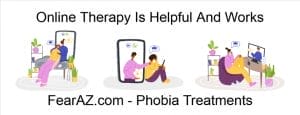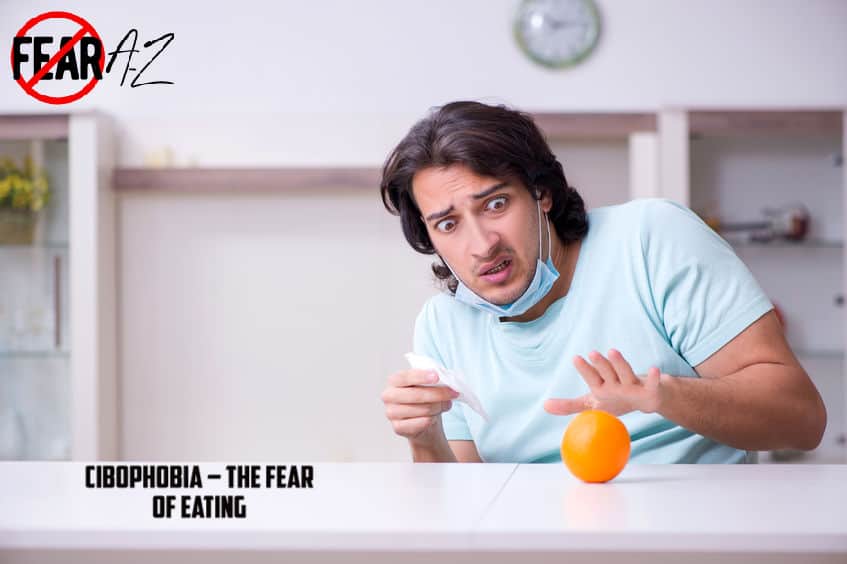Share This Article
Fear of Eating: Is It Serious?
Do you sometimes have a need to throw up while eating? Do you stay away from certain food or drinks for no reason at all? You might have cibophobia, also known as the fear of eating.
Cibophobia might not be as common as other phobias (such as the fear of spiders), but it can be dangerous, because it can affect your health. You can’t explain it, and it’s frustrating, because you often avoid eating simply because you are afraid of the food or drink itself.
If this sounds like you, read on. There is help for those suffering with cibophobia.
What Is Cibophobia?
Cibophobia is a complicated phobia that can be confused with other eating-related disorders, such as anorexia. While eating disorders are often associated with emotional problems, such as depression or body image issues, cibophobia is the fear of the actual food or what the food might do to your body.
Those with cibophobia are often afraid of food that might spoil easily, such as mayonnaise, milk, and even eggs. You fear eating food such as meat, believing that it might be spoiled. In some cases, you avoid foods that are soft, spongy, or slimy. You might also develop a bad habit of overcooking your food, because you fear what undercooked food might do to you.
While the phobia cibophobia is not considered an eating disorder, someone with cibophobia may have a common eating disorder—such as anorexia or bulimia the same time. However, a person with cibophobia is afraid of the actual food not what the eating the food may do.

What Are the Causes of Cibophobia?
Cibophobia develops from an acute awareness of the possible impact of consuming expired, undercooked, or overcooked food. Some of the most common causes of cibophobia include having bad experiences with food, such as an allergic reaction when you had a certain food or drink. These experiences usually trigger the phobia.
In some cases, you might have gotten sick consuming food that was not prepared properly. This led you to believe that having that particular food would always result in something bad happening to you. It takes you to a point where you become overly cautious about avoiding food prepared by others. You even dread taking a bite out of that perfectly fine leftover cake on the table at your house.
Cibophobia vs. Anorexia
Cibophobia is complicated, and it can rapidly turn into an obsession. Most people mistake cibophobia for the more common eating disorder, anorexia.
Anorexia is the fear of the food’s effect on overall body image. It is popularly called the “fear of eating too much” because of its impact on the physical body. Cibophobia, however, is being afraid of the food itself.
If unattended and untreated, cibophobiacs can become anorexics because of their fear of food. There are chances that you can suffer from both as well, but this can only be determined by a medical professional.
Symptoms of Cibophobia
Some physical symptoms are common in those with cibophobia. Most cibophobiacs experience extreme obsession with food preparation and worry too much about their food.
Physical Symptoms Include:
- Chest pain and tightness
- Dry mouth
- Increased blood pressure
- Lightheadedness
- Nausea
- Racing heartbeat
- Rapid speech or sudden loss of speech
- Shaking or trembling
- Shortness of breath
- Upset stomach
- Vomiting
Common Psychological Symptoms of Cibophobia Include:
- Avoiding perishable food items such as milk, eggs, and mayonnaise
- Being overly conscious about expiration dates
- Being uncomfortable with soft, slimy, or spongy food
- Being skeptical about food cooked by someone else
- Avoiding anything raw
- Questioning every ingredient and fearing the use of pesticides in fruits and vegetables
How to Treat Cibophobia
As mentioned, cibophobia can be a complicated phobia and may display symptoms similar to other eating disorders. If the phobia has become severe, then you might have no choice but to seek professional help. Fortunately, cibophobia treatment is readily available. Talk therapy is the first line of defense. Depending on how severe the phobia is, you may need medication as well.
Trying Self-Help
A big factor that influences your mindset about food is the information you take in related to it. Learning about food should help in making you more confident in the food you eat. The more information you get, the more likely you are to be able to eat the food that you’re concerned about.
Another prescribed way is to slowly introduce to your diet the very food you fear. This can be difficult, but taking slow steps to regain your confidence is a good way to go about overcoming the phobia.
You might try to eat the food one morsel at a time. In some cases, every step—from holding a spoon, taking food from this spoon, tasting the food, and finally chewing and swallowing the food—helps to overcome the fear.
You might ask family members to help you draw a “to-eat list” which you can then have while enjoying a family meal. You might also want to track your progress by listing down the amount of food you had in the past weeks or months.
As hard as it may be, attempt to face your fear by trying new food items. Even a single bite would be a great step. You must learn to release your desire to control everything that surrounds your food.
You also need to seek the help of your support group. You can eat out with a family member or a friend who is aware of your situation, and allow yourself to relax. Don’t think about your fear of eating in front of others and try to enjoy your food. If you feel frightened, take a deep breath and exhale.

Seeking Professional Help
Along with ways to help yourself overcome cibophobia, you can always seek the help of a doctor or a trained professional. Although there are different kinds of phobias, some of the treatments are the same.
Your therapist might employ cognitive behavioral therapy or CBT. This type of treatment is very popular. CBT involves you and your therapist discussing your fears. The therapist will then try to find ways to make food have a more positive impact on you.
Another popular way is exposure, which involves confronting what it is that you fear. As mentioned, you can take slow steps in overcoming food that you dread. Hypnosis can also be used to treat your phobia. The goal of the hypnotherapist (the person who uses hypnosis) is to lessen your fear of food.
Simple Tips to Overcome Cibophobia
Overcoming your fear of eating food is manageable and doable. Yes, it takes time, and it’s not a smooth experience. But here are some simple tips to help you.
- Don’t be too hard on yourself.
- Communicate with people you love and trust.
- Acknowledge the fear but don’t stop there.
- Try to change your perspective about food.
- Be open to taste and try—even if it’s a single bite.
- Don’t stress about food.
- Savor the taste and enjoy the flavor.
- Let go of your need to control.
- Don’t let society and social media demotivate you.
Recovering a Joy of Food
For most people, eating food is a wonderful experience. But for some, the mere thought of having food can be traumatic. Fortunately, there are many ways for you to overcome this fear. With therapy, some willpower, the help of loved ones, and positivity, you can bring back the joy of eating with family and friends.



